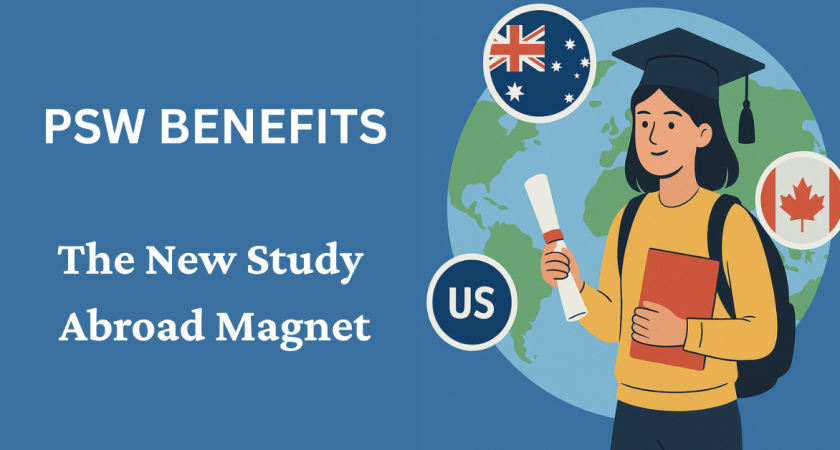In the constantly evolving field of international education, the phrase, Post-Study Work Visas has gained considerable traction among students who are planning to study abroad. A PSW allows international students to extend their stay in the host country after their graduation for a particular period mainly for them to gain work experience, build network, and even transition to permanent residency. Apart from global and cultural exposure, interdisciplinary education, and networking, PSW for international students also plays an important role in the decision-making process.
According to the QS International Student Survey (2023), over 70% of students consider work opportunities post-study as a key factor in deciding their study destination. The candidates aiming to build long-term international career often consider the PSW when choosing the country and the course they will study. Countries with favourable PSW policies experience a noticeable hike in student applications.
This blog delves deep into the growing significance and opportunities of PSW for international students and how it impacts their decision making regarding the country and the course of study.
WHAT IS A POST-STUDY WORK VISA?
A PSW (post-study work visa) is a type of visa that enables study abroad aspirants to remain in a foreign country for a specific period—typically 1-3 years. It is issued after they complete their graduation so that they can explore job options, gain practical experience, and in many cases, apply for long-term residency.
The primary goal of PSW is to bridge the gap between education and employment by giving students an opportunity to build a career in the real-world by applying their academic learning. Additionally, work after studying abroad is crucial for students to recover their educational costs and strengthen their career prospects.
PSW policies vary across major study abroad destinations and they often play a crucial role in moulding the students’ decision. Countries like the UK, Canada, and New Zealand offer PSW visas for up to 3 years while the USA offers a 12-month PSW visa.
Comparison of PSW Duration by Country
| COUNTRY | PSW DURATION | VISA NAME |
| United Kingdom | 2 years (3 for PhDs) | Graduate Route |
| Canada | Up to 3 years | Post-Graduation Work Permit (PGWP) |
| Australia | 2–6 years | Temporary Graduate Visa (Subclass 485) |
| United States | 12–36 months | Optional Practical Training (OPT) |
| Germany | 18 months | Job-Seeking Visa (post-study) |
WHY PSW HAS BECOME A KEY CONSIDERATION FOR STUDENTS
Besides post-study work benefits for international UG and PG students like career advancement, pathway to permanent residency, and personal growth, PSW has become an important factor for decision making in the context of Return On Investment (ROI).
Students and parents make decision based on long-term planning where they can recover educational and living costs. PSW is a key factor in making that decision.
DO STUDENTS CHOOSE COUNTRY FIRST OR COURSE FIRST? (OR BOTH?)
When students plan to pursue their studies abroad, they often face the dilemma, whether to choose the country first, or the course? Practically though, it is always a balance between academic goals and long-term career planning. Fondness towards a subject drives course selection, but the post-study benefits like permanent residency and PSW form the basis of choosing the country.
Do PSW rights impact study abroad decisions? Absolutely, yes. Countries that implement favourable PSW policies, often have more applicants compared to those that don’t offer such facilities. Students today are making decisions that are going to benefit them in the long run and considering PSW rights is an important factor for it.
POPULAR COURSES IN TOP PSW-FRIENDLY COUNTRIES
| Country | Popular Courses (High PSW & PR Value) | Why These Courses? |
| Canada | Computer Science, Data Analytics, Engineering, Healthcare, Business Management | High demand in job market, PR pathways through Express Entry, PGWP eligibility |
| Australia | Nursing, Information Technology, Engineering, Social Work, Accounting | Courses aligned with skilled occupation list; longer PSW for regional study |
| United Kingdom | Business Analytics, Finance, Artificial Intelligence, Public Health, Law | Graduate Route visa supports all degrees; high demand in finance and tech sectors |
| United States | STEM fields (Computer Science, Engineering, Data Science), Healthcare | OPT extension up to 3 years for STEM grads; strong job market for tech and healthcare |
| Germany | Engineering, Computer Science, Renewable Energy, Business Administration | Strong industrial demand; PSW allows job search flexibility post-graduation |
TOP COUNTRIES OFFERING ATTRACTIVE PSW OPPORTUNITIES
Availability of suitable PSW policies plays a crucial part in shaping a student’s decision while choosing the country for their education. Let’s explore what are some of the best countries for PSW.
1. UNITED KINGDOM (UK)
UK’s “Graduate Route”, is an easily accessible PSW visa as no job offer is required to apply for it. It enables international students to remain in the host country for 2 years (3 for PhD) after graduating.
2. CANADA
Canada allows students to work up to 3 years with its Post-Graduation Work Permit (PGWP), after completing a program for at least 2 years. The application process is simple and straightforward, and it is easy for international students to transition to permanent residency due to Canada’s Express Entry System.
3.AUSTRALIA
Australia’s PSW visa, Temporary Graduate Visa (Subclass 485), allows one of the longest stays for international students, from 2-6 years, depending on the qualification. Graduates from high demand fields like STEM and healthcare get extended stay periods and permanent residency prospects. It is one of the best study destinations with long post-study work visas.
4.GERMANY
Germany’s Job-Seeking Visa (post-study) permits students to stay for 18 months post-study to find employment. They can choose any field to work in and successful employment may lead to long-term residence or an EU Blue Card.
5. UNITED STATES
Optional Practical Training (OPT), offering up to 12 months of work authorization, with a 24-month extension for STEM graduates. CPT (Curricular Practical Training) can be used while studying and offers practical training that is integrated into your degree program.
Not sure which country offers better PSW benefits?
Get personalized guidance from our top-rated Study Abroad Consultants.
PSW Policy Snapshot: Eligibility, Duration, PR Links
| Country | Eligibility | Duration | PR Links |
| Canada | Completion of eligible post-secondary program (8+ months) | Up to 3 years | Strong: Express Entry, PNP, Canadian Experience Class |
| Australia | Completion of CRICOS-registered course (2+ years); age below 50 | 2–6 years (varies by level/location) | High: General Skilled Migration, Regional Visas |
| United Kingdom | Completion of UK degree from licensed sponsor | 2 years (3 for PhDs) | Moderate: Skilled Worker Visa post-PSW |
| Germany | Completion of a recognized German degree | 18 months | Strong: EU Blue Card, PR via job in field of study |
| United States | F-1 visa holders with completed degree; OPT requires field-related job | 12 months OPT (+24 months for STEM) | Limited: H-1B, Employment-Based Green Card (EB-2/EB-3) |

CASE STUDY: HOW PSW IMPACTS REAL STUDENT DECISIONS
PSW opportunities actively shape a student’s decisions in choosing the country and course for their higher studies.
For instance, Siya, a postgraduate student, who is unable to choose between UK and Australia for her Master’s in Public Health. Both countries had great opportunities and top-ranked universities, but Australia’s 3-year PSW for Master’s graduates worked best for her. It offered her increased chances for applying for permanent residency while the 2-year limit offered by UK, though appealing, did not offer the same security in terms of long-term planning.
Another candidate, Saket, a tech based undergraduate, who initially planned on studying business in the US, switched to data analytics upon learning about the 24-month STEM OPT extension. It would provide him with better chances at obtaining an H-1B Visa.
From these examples we can comprehend how post-study work visas influence country selection for students.
PSW IS A BIG PIECE — BUT NOT THE WHOLE PUZZLE
While Post-study Work opportunities are a major factor for students in decision making, it is not the only one. Students and their parents consider numerous factors before coming to a conclusion.
Living costs and tuition fees, availability of scholarships are important factors for self-funded students.
University rankings, program reputation, and courses offered also influence decisions.
In the end, it is about finding the right balance between academics, finance and long-term career prospects.
CONCLUSION
For many students, recovering costs, gaining international work experience and pursuing permanent residency makes PSW an important deciding factor. Although an essential one, it should not be the only consideration for international students. They must look at the full picture, including living costs, academics and overall quality of life.
Written By Hemangi Kedia.
